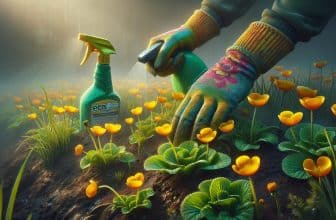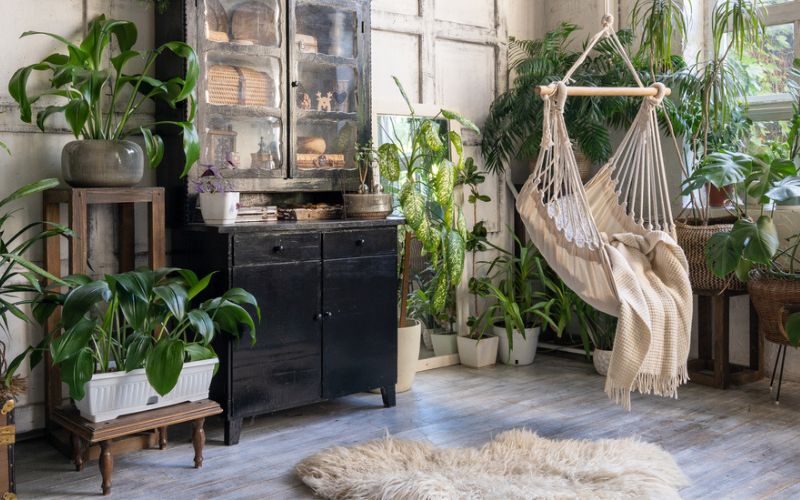
The Importance of Pest-Free Houseplants
Having lush, vibrant houseplants not only adds beauty to our homes but also offers a plethora of health benefits. These green companions purify the air, increase humidity, and reduce stress. However, pests can compromise the vitality and allure of our beloved plants.
Growing Interest in Natural Solutions for Indoor Plant Pest Control
As awareness of the harmful effects of chemical pesticides grows, there is a significant shift towards adopting natural solutions for indoor plant pest control. Natural insecticides provide an eco-friendly alternative, effectively combating pests while ensuring the safety of humans, pets, and the environment.
Benefits of Natural Insecticides
Effectiveness in Combating Indoor Plant Pests
Natural insecticides have proven highly effective in dealing with indoor plant pests. These eco-friendly alternatives target common pests and disrupt their life cycles, preventing further infestations. By utilizing natural ingredients, they provide a sustainable and long-term solution to maintain pest-free houseplants.
Safety for Humans, Pets, and the Environment
One of the most significant advantages of natural insecticides is their safety for humans, pets, and the environment. Unlike chemical pesticides, which leave harmful residues and pose health risks, natural insecticides are derived from plant-based ingredients and are non-toxic. This ensures that we can protect our houseplants without compromising the well-being of our loved ones or the ecosystem.
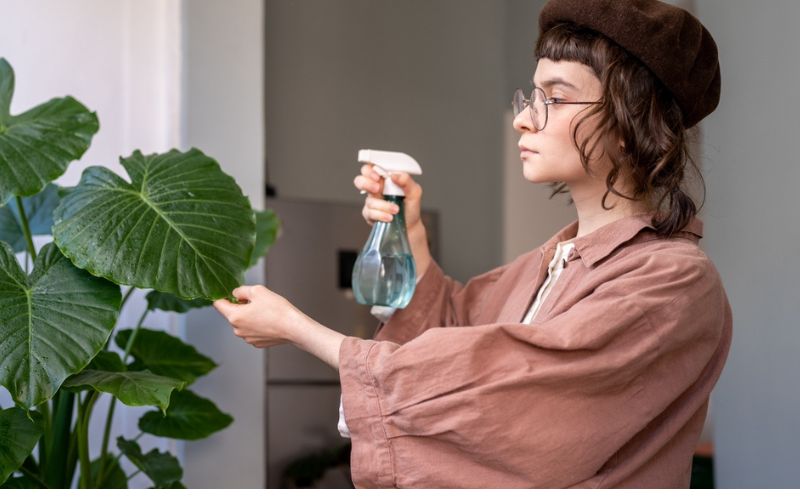
Preservation of Overall Plant Health
Natural insecticides not only eradicate pests but also help preserve the overall health of houseplants. Chemical pesticides can sometimes harm beneficial insects and disrupt the delicate balance of the ecosystem. On the other hand, natural insecticides selectively target pests, allowing beneficial insects to thrive and contribute to the well-being of the plants.
Common Indoor Plant Pests
Aphids
Aphids are small, soft-bodied insects that feed on plant sap. They reproduce rapidly and can quickly infest houseplants, causing stunted growth, distorted leaves, and the presence of honeydew, a sticky substance that attracts mold and other pests.
Spider Mites
Spider mites are tiny arachnids that often go unnoticed until visible damage appears. They feed on plant tissues, causing yellowing or stippling of leaves, fine webbing, and eventual leaf drop. Indoor plants are particularly susceptible to spider mite infestations in warm and dry environments.
Fungus Gnats
Fungus gnats are small flying insects commonly found around houseplants. Their larvae live in the soil and feed on organic matter, including plant roots. Fungus gnat infestations can lead to root damage, poor plant growth, and the presence of dark, mushroom-like growth on the soil surface.
Mealybugs
Mealybugs are tiny insects covered in a white, cotton-like substance. They typically infest the stems, leaves, and leaf axils of plants. Mealybugs feed on plant sap, causing stunted growth, yellowing of leaves, and the secretion of honeydew, which attracts ants and promotes the growth of sooty mold.
Whiteflies
Whiteflies are small, flying insects that resemble tiny white moths. They congregate on the undersides of leaves and suck plant sap, leading to yellowing, wilting, and leaf drop. Whitefly infestations can also result in the development of sooty mold due to the honeydew they produce.
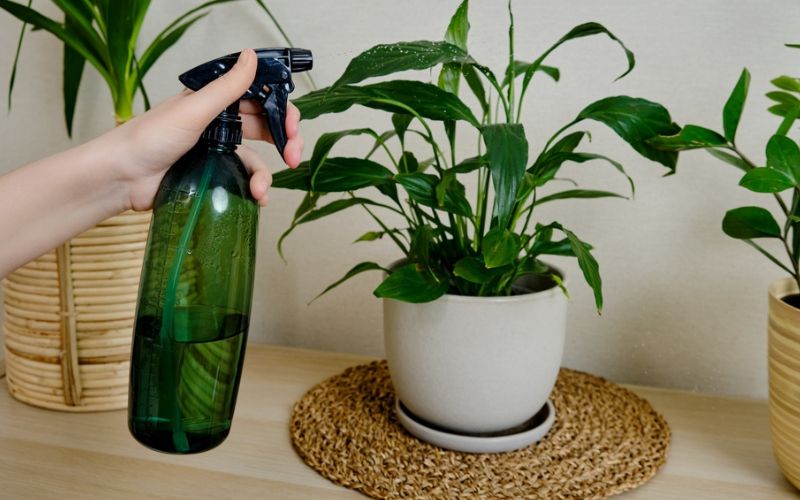
Types of Natural Insecticides
Neem Oil
Neem oil, derived from the neem tree, is an effective natural insecticide. It disrupts the life cycle of pests, repels them, and acts as a growth regulator. Neem oil is safe for humans, pets, and beneficial insects when used according to the instructions. It can be applied by diluting it in water and spraying it on the affected plants, focusing on the undersides of leaves where pests often reside.
Diatomaceous Earth
Diatomaceous earth is a natural powder made from fossilized aquatic organisms called diatoms. It works by physically damaging the exoskeletons of pests, causing dehydration and death. Diatomaceous earth is safe for humans and pets but can be abrasive, so it’s important to avoid inhaling it. It can be sprinkled on the soil or directly on the leaves of infested plants.
Pyrethrin
Pyrethrin is a natural insecticide derived from the chrysanthemum flower. It acts as a powerful neurotoxin, paralyzing and killing pests on contact. Pyrethrin is considered low in toxicity for humans and pets but can be harmful to beneficial insects, so it should be used judiciously. It is available in spray form and can be applied directly to affected plants.
Essential Oils
Certain essential oils, such as peppermint, rosemary, and lavender, have insecticidal properties. They can repel pests and disrupt their life cycles. Essential oils should be diluted in water and sprayed on plants. While generally safe for humans and pets, some essential oils can be toxic in high concentrations, so proper dilution and moderation are important.
Application Guidelines
Proper dilution ratios
When using natural insecticides, it is crucial to follow the recommended dilution ratios provided by the manufacturer. Diluting them correctly ensures effectiveness while minimizing the risk of plant damage.
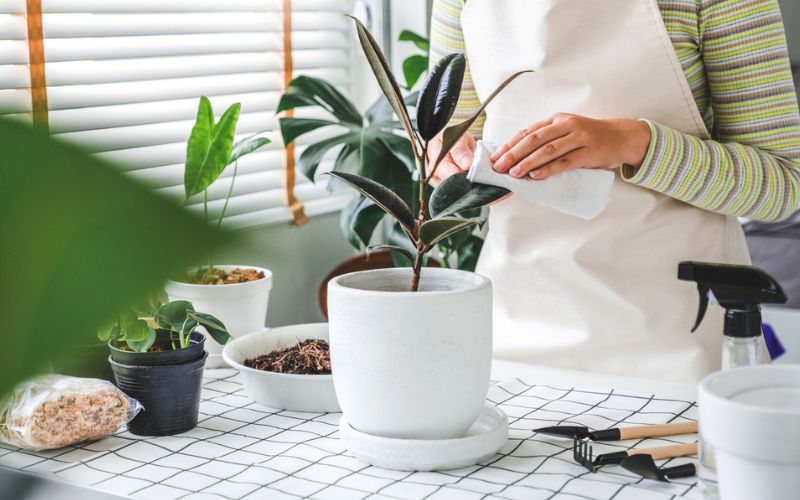
Application methods (spraying, wiping, drenching)
Natural insecticides can be applied using various methods, including spraying, wiping, or drenching. Spraying is suitable for targeting pests on leaves and stems, while wiping can be used for small infestations. Drenching involves pouring the insecticide solution directly into the soil to combat pests dwelling in the roots.
Frequency of application
The frequency of application depends on the severity of the infestation and the specific natural insecticide being used. Follow the manufacturer’s instructions regarding the recommended intervals between applications to achieve optimal results.
Importance of following manufacturer instructions
To ensure the safe and effective use of natural insecticides, it is essential to carefully read and follow the manufacturer’s instructions. Each product may have specific guidelines regarding dilution, application methods, and safety precautions.
DIY Natural Insecticide Recipes
Neem oil spray
To make a neem oil spray, mix 1-2 teaspoons of neem oil with 1 quart of water. Add a few drops of liquid dish soap as an emulsifier. Shake the mixture well before use.
Precautions
Avoid spraying neem oil during peak sunlight hours to prevent leaf burn. Perform a spot test on a small portion of the plant before applying the spray to the entire plant.
Homemade insecticidal soap
To make homemade insecticidal soap, mix 1 tablespoon of liquid dish soap (preferably mild and biodegradable) with 1 quart of water. Stir the solution gently until well combined.
Precautions
Apply the insecticidal soap to the affected areas of the plant, ensuring complete coverage. Avoid spraying on delicate or sensitive plants, and rinse the plant thoroughly after a few hours to remove any soap residue.
Essential oil spray
To create an essential oil spray, combine 5-10 drops of essential oil (peppermint, rosemary, or lavender) with 1 quart of water. Shake the mixture well before each use.
Precautions
Perform a spot test on a small portion of the plant to check for any adverse reactions before spraying the solution onto the entire plant. Avoid spraying essential oils near open flames or heat sources.
Precautions and Considerations
Allergic reactions and sensitivities
Some individuals may be sensitive or allergic to certain natural insecticides or their ingredients. It is advisable to wear gloves and perform a patch test on a small area of the skin before handling or applying any insecticides.
Spot testing on foliage
Before applying any natural insecticide to the entire plant, it is important to conduct a spot test on a small and inconspicuous area of the foliage. This allows you to observe if the plant shows any adverse reactions, such as wilting, yellowing, or leaf damage, as a result of the treatment. Spot testing helps ensure that the insecticide is safe to use on the entire plant without causing harm.
Wearing protective gloves
When handling natural insecticides, especially concentrated solutions or powders, wearing protective gloves is essential to prevent skin irritation or allergic reactions.
Ensuring proper ventilation during application
During the application of natural insecticides, ensure that the area is well-ventilated. This prevents the accumulation of fumes or strong odors, ensuring a safe environment for both humans and plants.
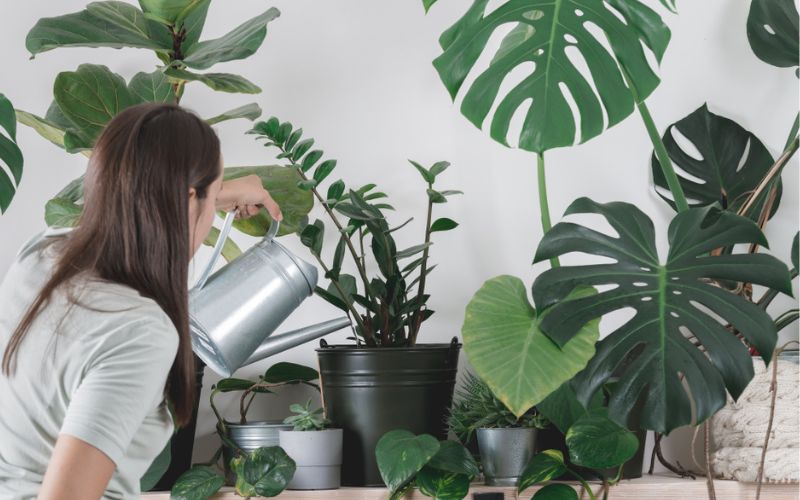
Alternative Pest Control Methods
Promoting plant health through proper watering and fertilization
Maintaining healthy houseplants is crucial in preventing pest infestations. Proper watering and fertilization practices ensure that plants are strong and less susceptible to pests. Avoid overwatering, as it can create favorable conditions for pests and diseases.
Using physical barriers like sticky traps
Sticky traps are effective in trapping flying pests like fungus gnats and whiteflies. Placing yellow or blue sticky traps near infested plants helps control their populations by attracting and trapping them.
Employing beneficial insects like ladybugs or predatory mites
Introducing beneficial insects, such as ladybugs or predatory mites, can help control pest populations naturally. These insects feed on common indoor plant pests, providing long-term pest control without the need for chemical intervention.
Conclusion
Protecting our houseplants from pests is crucial for their overall health and longevity. Natural insecticides provide a safe and effective solution, ensuring the well-being of both the plants and the environment.
By embracing nature’s shield, we can maintain beautiful, pest-free houseplants while promoting sustainability and reducing our reliance on chemical pesticides. Remember to always follow the instructions and guidelines provided for each natural insecticide to achieve the best results.
Natural Insecticides FAQs
Are natural insecticides as effective as chemical pesticides?
Natural insecticides can be highly effective in controlling indoor plant pests when used correctly and consistently. While they may require more frequent applications compared to chemical pesticides, they offer the advantage of being safe for humans, pets, and the environment.
Can natural insecticides harm beneficial insects?
Unlike chemical pesticides, natural insecticides are more selective in targeting pests, minimizing harm to beneficial insects. When used as recommended, natural insecticides can help maintain a healthy ecosystem within and around houseplants.
Can I use natural insecticides on edible plants?
Yes, many natural insecticides are safe to use on edible plants. However, it is essential to read the labels and follow the guidelines provided by the manufacturer to ensure safe consumption.
How often should I apply natural insecticides?
The frequency of application depends on the severity of the infestation and the specific natural insecticide being used. Follow the instructions provided by the manufacturer to determine the appropriate intervals for application.
Can I make my own natural insecticides at home?
Yes, there are several DIY recipes for natural insecticides using ingredients like neem oil, essential oils, and insecticidal soap. However, it is crucial to follow the recipes carefully and perform spot tests before applying homemade solutions to the entire plant.
Colin Macmillan is a seasoned entrepreneur and the CEO of Riverwood Landscape, a leading landscaping company based in Canada. He has been at the helm of the company since leaving high school, demonstrating his strong leadership skills and business acumen.
Colin’s expertise lies in various aspects of landscaping, including lawn care, interlocking, sod installation, and commercial maintenance. His hands-on approach and dedication to the craft have been instrumental in building Riverwood Landscape into a reputable brand.
One of his most notable achievements is the creation of a successful landscape franchise that services multiple locations. This accomplishment underscores his strategic thinking and ability to scale operations effectively.
Colin has also had the privilege of working with Guelph Hospital for landscaping and maintenance, a testament to the trust and reliability that his company has earned over the years.
His professional mission is to offer the best services and experiences for customers, a goal that he tirelessly pursues. Colin’s commitment to excellence and customer satisfaction continues to drive the growth and success of Riverwood Landscape.





